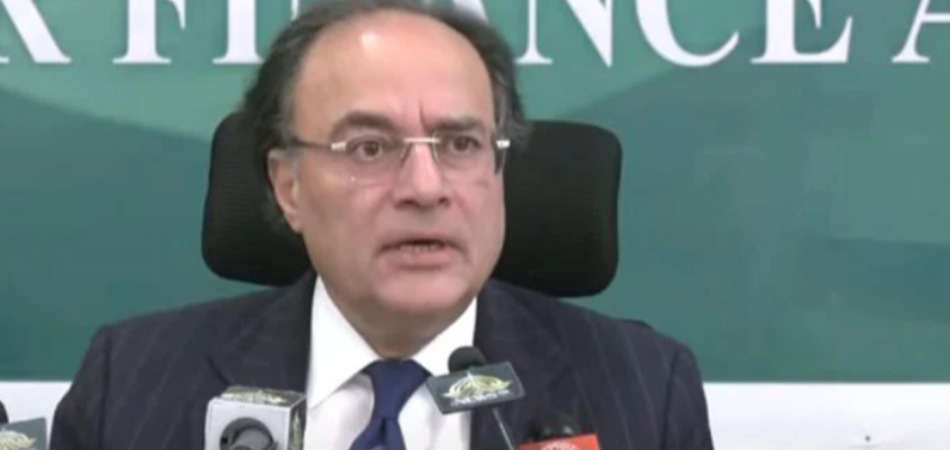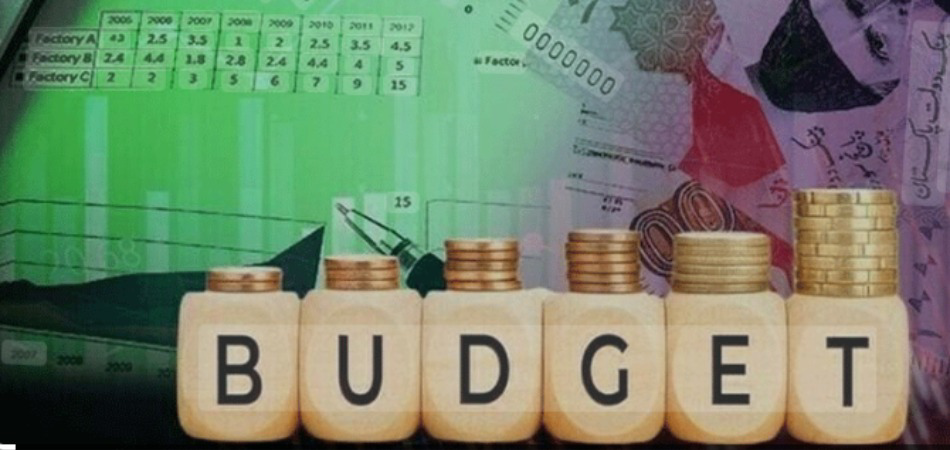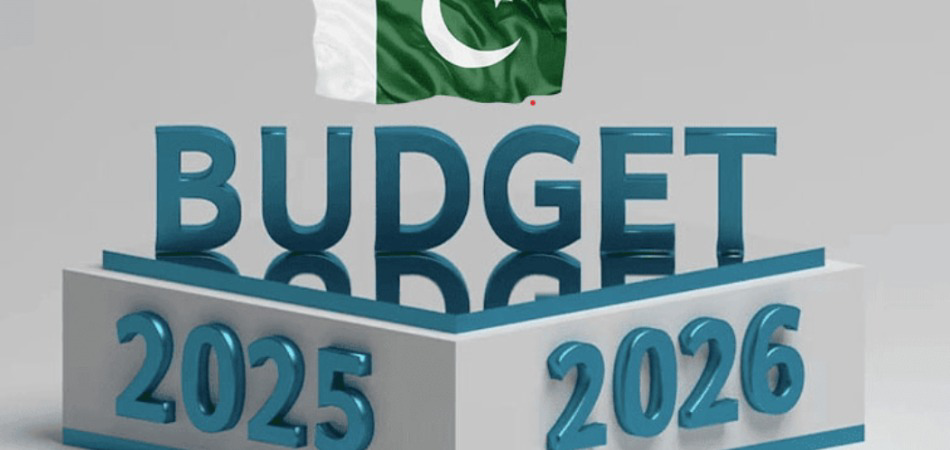Finance Minister holds post-budget presser on FY26 plans

MG News | June 11, 2025 at 01:08 PM GMT+05:00
June 11, 2025 (MLN): Finance Minister Muhammad Aurangzeb addressed a post-budget press conference today to elaborate on the government’s fiscal priorities and strategies for the financial year 2025–26 (FY26), following the presentation of a Rs17.57 trillion federal budget.
The session began amid a brief walkout by journalists who initially boycotted the event due to the absence of the traditional Federal Board of Revenue (FBR) technical briefing.
Aurangzeb described the budget as a foundational step towards transforming Pakistan into a competitive, export-oriented economy, calling it the beginning of “changing the DNA” of the economy.
The budget sets a 4.2% GDP growth target and outlines relief for the salaried class, alongside a 7% reduction in federal expenditures.
The fiscal deficit is projected to narrow to 3.9% of GDP, or Rs5,037 billion, down from 5.9%, while inflation has been targeted at 7.5%.
One of the key features of the budget is the introduction of long-overdue tariff reforms.
The minister announced that additional customs duties had been eliminated on 4,000 of the 7,000 tariff lines a move aimed at simplifying trade and enhancing industrial productivity.
He lamented that such reforms had not been undertaken in over 30 years and stressed their importance in boosting exports and modernizing the economy.
On tax policy, Aurangzeb stated that Pakistan’s current tax-to-GDP ratio stands at 10.3%, with a goal of reaching 10.9% in FY26. He emphasized the need for enabling legislative amendments to address revenue leakages, reduce reliance on new taxation, and strengthen enforcement.
Of the Rs2.2tr revenue target for FY26, only Rs312bn is from new taxes, with the remaining amount expected from enforcement which has already yielded over Rs400bn this year.
He stressed that the government will seek parliamentary support to strengthen tax laws and enforcement capacity.
Importantly, the minister highlighted strict measures against non-filers, suggesting that if approved, non-filers could be completely locked out of the country’s financial system.
This step is aimed at broadening the tax base and ensuring compliance.
Addressing the agricultural sector, Aurangzeb confirmed that no new taxes had been imposed on fertilisers or pesticides, noting that these were “critical inputs.”
He credited Prime Minister Shehbaz Sharif for negotiating this exemption with the IMF.
He further stated that the government would collaborate with provinces to develop agriculture and livestock sectors and would provide small farmers with easy-term loans, acknowledging that agricultural policy is a devolved subject.
The finance minister also called for a clear national policy on agriculture and livestock, adding that the Centre was committed to reducing the role of middlemen and improving rural financing mechanisms.
Speaking on pensions and salaries, Aurangzeb stressed the need for alignment with inflation benchmarks.
He emphasized that salary and pension increases whether in the public or private sector should follow clear and consistent standards, as is the case internationally.
The budget includes measures to benchmark future adjustments accordingly.
He reiterated that the government had tried to provide as much relief as possible within the limits of its fiscal space.
However, he was candid about Pakistan’s reliance on borrowing, stating, “Our budget starts with a deficit. Whatever the government is providing, it is doing so by taking loans.”
While some expenditures have increased, he defended these allocations as necessary to support essential public needs. Nonetheless, he acknowledged that unsustainable borrowing practices must be controlled to avoid further debt accumulation.
On the issue of government spending, Aurangzeb responded to public criticism by stating that federal expenditures increased by only 1.9% in the outgoing year.
He said that subsidies and debt-servicing costs were curtailed, while essential development expenditures were prioritized.
This year, he added, federal expenditures have been limited to just 2%, in a bid to demonstrate the government’s commitment to fiscal responsibility.
Aurangzeb reaffirmed the importance of aligning salaries and pensions with inflation, noting that this is a globally accepted standard across both public and private sectors.
He called for the establishment of a clear and consistent benchmark to guide such adjustments, ensuring they reflect economic realities fairly.
Turning to the agricultural sector, the finance minister highlighted the need for a well-defined national policy on agriculture and livestock, developed in collaboration with provincial governments.
Given that these sectors fall under devolved responsibilities, he stressed the importance of coordinated efforts to drive sustainable growth.
As part of the government's broader relief efforts, he announced plans to offer concessional loans to small farmers, reiterating that despite fiscal constraints, targeted support will be prioritized to uplift the most vulnerable segments.
Commenting on recent salary increases for the Senate chairman and National Assembly speaker, Aurangzeb clarified that these were long overdue adjustments.
“The last increase for ministers and parliamentarians was in 2016,” he noted, dismissing criticism by calling the hike a long-pending correction rather than an indulgence.
The minister emphasized the urgent need to bring Pakistan’s Rs9.4tr cash economy into the documented sector.
He acknowledged that past reform measures lacked implementation and insisted that real progress starts with recognition of such failures.
“We have laws and taxes, but enforcement has been the missing link. That’s what we’re fixing now,” he stated.
He admitted that reversing long-standing negative trends would take time but expressed cautious optimism that the right structural changes were finally being put in motion.
Adding to the discussion, FBR officials elaborated on the scrutiny framework for non-profit organisations (NPOs).
It was clarified that while globally NPOs are not typically subject to taxation, in Pakistan, no institution would be beyond scrutiny moving forward.
Organisations claiming non-profit status will need to demonstrate that they are not operating on a commercial basis.
FBR representatives noted that the tax regime remains based on self-assessment, but additional checks have been instituted.
For better monitoring, the FBR has now compiled dedicated classification tables to assess NPO activity and eligibility, reinforcing that exemptions cannot be taken for granted without proper justification.
Responding to a question on the National Finance Commission (NFC) Award, Finance Minister Muhammad Aurangzeb stated that any decisions regarding the delinking of population from the NFC formula would be made in full consultation with the provinces.
He reaffirmed that nothing will be done unilaterally, including matters related to the national fiscal pact signed with provincial governments.
Reflecting on a decade of economic observation, Aurangzeb candidly admitted to the chronic lack of implementation in past reform proposals.
“Over the past 10 years, I’ve been looking at the state of the economy… I have never seen anything going up go downwards,” he said, acknowledging that true reform must begin with recognition of systemic failure.
He emphasized the government's intention to reverse long-standing distortions and signal seriousness toward structural change, especially for burdened sectors like the formal workforce and salaried class.
The finance minister also pointed to two concrete measures recently taken by the government to document Pakistan’s Rs9.4tr cash economy, although he did not detail them further during the briefing.
On the issue of circular debt, the FBR chairman noted that contract revisions for power firms had been undertaken last year and said that the power sector was pushing for broader reforms, including access to cheap credit and a more enabling environment.
Regarding the taxation of solar panels, the FBR clarified the distinction between fully assembled imported panels and locally assembled ones.
The latter had been taxed at 18%, while imported panels were exempt, creating an uneven playing field. FBR chairman Langrial explained that since solar technology has become cheaper, the government has ended the “anomalies” to encourage fair competition.
Sales tax revisions were also addressed by FBR Inland Revenue member Dr. Najeeb Ahmad, who explained the rationale behind the newly introduced differentiated tax rates.
A reduced rate of 0.25% has been applied to electrical goods priced below Rs20,000 sold through e-commerce platforms, reflecting their relatively low profit margins.
In contrast, a 2% tax has been imposed on high-end boutique clothing ranging from Rs15,000 to Rs18,000, where profit margins typically range between 10% and 20%.
He also pointed out that grocery items, despite having lower profit margins, are naturally subject to a higher tax rate.
He emphasized that the FBR’s tax policy no longer applies a uniform burden and now better reflects industry-specific dynamics.
Dr. Ahmad also addressed the digital sales tax gap, pointing out that delivery-based cash transactions through online platforms were previously under-reported.
He warned that Pakistan’s digital tax base is being eroded, especially by vendors classifying domestic sales as exports to avoid taxes.
In response to a question about youth support, Aurangzeb underlined the government’s priority to create an “enabling environment” for young people.
He highlighted the $400m earned by freelancers last year and stressed the importance of investing in tech education to help young coders raise their hourly earnings from $8–10 to $100.
Commenting on local investment challenges, he called for an end to protectionism and stressed the need to lower raw material prices to increase productivity across all export-oriented sectors, not just textiles.
On the matter of external debt servicing, Aurangzeb confirmed that Pakistan is fully prepared to repay its obligations.
The first $500m Eurobond repayment is due in September, followed by another in March.
He reiterated that the government remains ready to fulfill its debt commitments.
The minister also revealed plans to launch yuan-denominated Panda bonds within the year.
Additionally, he disclosed ongoing efforts for credit enhancement through the Asian Development Bank (ADB) and the Asian Infrastructure Investment Bank (AIIB).
He expressed optimism that if Pakistan’s international credit ratings improve, the country could access the euro and US dollar bond markets in 2026, though not before the end of this calendar year.
Copyright Mettis Link News
Related News
| Name | Price/Vol | %Chg/NChg |
|---|---|---|
| KSE100 | 139,871.40 32.44M | 1.05% 1459.15 |
| ALLSHR | 86,544.43 73.63M | 0.98% 841.47 |
| KSE30 | 42,738.10 17.10M | 1.14% 483.26 |
| KMI30 | 196,788.69 18.94M | 1.38% 2679.10 |
| KMIALLSHR | 57,380.80 31.74M | 1.18% 667.13 |
| BKTi | 38,113.99 2.14M | 0.75% 282.65 |
| OGTi | 28,029.73 5.93M | 2.15% 589.10 |
| Symbol | Bid/Ask | High/Low |
|---|
| Name | Last | High/Low | Chg/%Chg |
|---|---|---|---|
| BITCOIN FUTURES | 119,165.00 | 119,430.00 117,905.00 | 1545.00 1.31% |
| BRENT CRUDE | 72.23 | 72.82 72.19 | -1.01 -1.38% |
| RICHARDS BAY COAL MONTHLY | 96.50 | 0.00 0.00 | 2.20 2.33% |
| ROTTERDAM COAL MONTHLY | 104.50 | 104.50 104.50 | -0.30 -0.29% |
| USD RBD PALM OLEIN | 998.50 | 998.50 998.50 | 0.00 0.00% |
| CRUDE OIL - WTI | 69.85 | 70.41 69.83 | -0.15 -0.21% |
| SUGAR #11 WORLD | 16.46 | 16.58 16.37 | -0.13 -0.78% |
Chart of the Day
Latest News
Top 5 things to watch in this week
Pakistan Stock Movers
| Name | Last | Chg/%Chg |
|---|
| Name | Last | Chg/%Chg |
|---|



